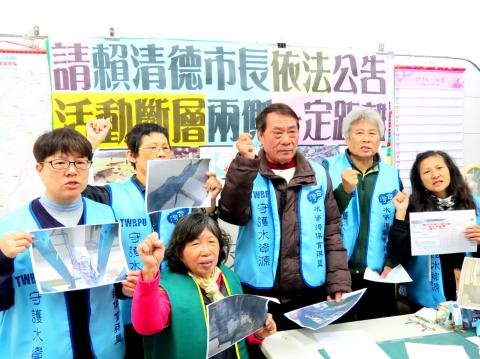A coalition of environmental groups yesterday called on the Tainan City Government to ban buildings more than two stories high near active fault lines after a magnitude 6.4 earthquake that leveled or damaged several buildings in Tainan on Feb. 6.
The coalition asked the city government to limit construction in the vicinity of active faults to follow a precedent set by Nantou County after the 921 Earthquake in 1999.
Nantou County Government in 2000 prohibited buildings from being constructed at public properties and buildings more than two stories or 7m high from being built on private properties within 15m of the Chelungpu Fault (車籠埔斷層), which stretches along the county and Taichung and whose displacement caused the quake on Sept. 21, 1999.

Photo: Tsai Wen-chu, Taipei Times
Properties located on fault zones must be marked as such on ownership certificates to prevent damage to potential buyers, according to Nantou regulations.
“We called on [Tainan Mayor] William Lai (賴清德) to follow suit and restrict construction in risky areas, especially the city’s Sinhua Fault (新化斷層) and Houjia Fault (後甲斷層), in addition to making public a soil liquefaction hazard map and examining the safety of existing buildings,” Taiwan Water Resources Protection Union director Charles Lee (李建畿) said.
Dislocation of the Sinhua Fault and Houjia Fault might have contributed to the Feb. 6 earthquake, according to an analysis by Taiwan Earthquake Research Center Director Ma Kuo-fong (馬國鳳).
A magnitude 6.9 earthquake occurred along the Sinhua Fault in 1946, which killed 58 people and destroyed 633 buildings, Lee said.
The southwest has the highest frequency of earthquakes in the nation, and has an about 64 percent of chance of being hit by a magnitude 6.5 or higher earthquake in the next 30 years, according to a risk analysis by the center, Lee added.
Fight for Health Women’s Group southern division director Chiu Chun-hua (邱春華) said the building she lived in at Tainan’s East District (東區) was damaged by the Feb. 6 earthquake, and was later designated as a dangerous building in need of reinforcement, with residents told to evacuate.
“Many buildings in the city were constructed before the 921 Earthquake and only designed to resist magnitude 5 quakes, so they might not be able to stand another strong earthquake,” Chiu said, calling on the government to set up earthquake-resistant construction regulations and tighten construction management before another earthquake occurs.

The High Prosecutors’ Office yesterday withdrew an appeal against the acquittal of a former bank manager 22 years after his death, marking Taiwan’s first instance of prosecutors rendering posthumous justice to a wrongfully convicted defendant. Chu Ching-en (諸慶恩) — formerly a manager at the Taipei branch of BNP Paribas — was in 1999 accused by Weng Mao-chung (翁茂鍾), then-president of Chia Her Industrial Co, of forging a request for a fixed deposit of US$10 million by I-Hwa Industrial Co, a subsidiary of Chia Her, which was used as collateral. Chu was ruled not guilty in the first trial, but was found guilty

DEADLOCK: As the commission is unable to forum a quorum to review license renewal applications, the channel operators are not at fault and can air past their license date The National Communications Commission (NCC) yesterday said that the Public Television Service (PTS) and 36 other television and radio broadcasters could continue airing, despite the commission’s inability to meet a quorum to review their license renewal applications. The licenses of PTS and the other channels are set to expire between this month and June. The National Communications Commission Organization Act (國家通訊傳播委員會組織法) stipulates that the commission must meet the mandated quorum of four to hold a valid meeting. The seven-member commission currently has only three commissioners. “We have informed the channel operators of the progress we have made in reviewing their license renewal applications, and

‘DENIAL DEFENSE’: The US would increase its military presence with uncrewed ships, and submarines, while boosting defense in the Indo-Pacific, a Pete Hegseth memo said The US is reorienting its military strategy to focus primarily on deterring a potential Chinese invasion of Taiwan, a memo signed by US Secretary of Defense Pete Hegseth showed. The memo also called on Taiwan to increase its defense spending. The document, known as the “Interim National Defense Strategic Guidance,” was distributed this month and detailed the national defense plans of US President Donald Trump’s administration, an article in the Washington Post said on Saturday. It outlines how the US can prepare for a potential war with China and defend itself from threats in the “near abroad,” including Greenland and the Panama

Taiwan People’s Party (TPP) Chairman Huang Kuo-chang (黃國昌) yesterday appealed to the authorities to release former Taipei mayor Ko Wen-je (柯文哲) from pretrial detention amid conflicting reports about his health. The TPP at a news conference on Thursday said that Ko should be released to a hospital for treatment, adding that he has blood in his urine and had spells of pain and nausea followed by vomiting over the past three months. Hsieh Yen-yau (謝炎堯), a retired professor of internal medicine and Ko’s former teacher, said that Ko’s symptoms aligned with gallstones, kidney inflammation and potentially dangerous heart conditions. Ko, charged with